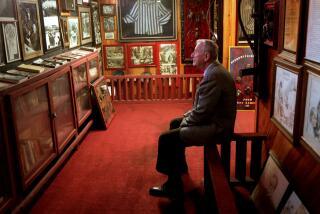Nazi Mengele Felt ‘No Guilt,’ Son Says
- Share via
MUNICH, West Germany — Life as a hunted man left Josef Mengele an unrepentant but “frightened creature” who considered suicide as he aged, a West German magazine said this week in its first installment of a series based on documents from the Nazi fugitive’s son.
Rolf Mengele, 41, indicated that his father felt “no guilt” over his role in World War II, when he performed grisly experiments on inmates of the Auschwitz concentration camp, the weekly Bunte said.
The son was also quoted as saying Mengele lived on about $100 a month sent by his relatives from Bavaria during three decades as a recluse in Europe and South America, hiding from Nazi hunters.
Rolf Mengele, a lawyer in Freiburg, broke years of silence last week to announce that his father, implicated in the death of hundreds of thousands of concentration-camp inmates, died in 1979. He said he was certain that remains exhumed June 6 near Sao Paulo, Brazil, are his father’s.
Brazilian authorities also say they believe the bones are Mengele’s, but positive identification has not yet been made.
In one of West Germany’s most extensive looks at a fugitive Nazi, Bunte will publish on Thursday the first installment of what it claims are exclusive photographs and details of Mengele’s life on the run.
An advance copy provided to reporters has a cover with a color photograph of a smiling man, said to be Mengele in 1977 on the same Brazilian beach where authorities believe he drowned in 1979.
Bunte said it had not published the materials “without skepticism” and was submitting them to a panel of experts and historians for verification.
‘Great Pity’
In one letter to his son, Mengele said “it was a great pity that so gifted a man as he, who could have been one of the world’s great medical scientists in Europe or the United States, should be condemned by fate to live in hiding,” according to one of the experts, historian Guenther Deschner.
Mengele is also quoted as writing: “While I cannot hope for understanding and sympathy from you for my life’s actions, at the same time I have absolutely no reason to try to justify or excuse whatever decisions, actions or behavior of mine.”
Bunte said that in May, 1977, Rolf flew to Sao Paulo, and Wolfram Bossert, a friend of his father’s, drove him to Mengele’s house near Sao Paulo.
“The man who stood before me in 1977 was a frightened creature,” Bunte quoted Rolf as saying.
Rolf saw “his father was full of fear, that he suffered from depression, that he intended to commit suicide,” Bunte said.
Bunte gave only sketchy details about Mengele’s life and none about his flight from postwar Germany to South America but said more would come in future editions.
Meanwhile, in Sao Paulo on Tuesday, a forensic expert involved in the Mengele investigation said there are still not enough records to make a positive identification of the skeleton believed to be Mengele’s.
Dr. Wilmes Teixeira appealed to doctors who might have treated Mengele in recent years to provide X-rays of the chest, limbs, skull, spine and teeth.
Authorities also said they have found four more teeth in the dirt under the casket, giving a total of 10 teeth from the burial site.
Sao Paulo Police Chief Romeu Tuma said investigators have returned to a house owned by the Bosserts in the Sao Paulo suburb of Brooklin and found several books with handwritten notations, strands of hair and a tape recording of a speech by Adolf Hitler that ends,”Our dear country, our dear German Reich, Sieg Heil!”
More to Read
Sign up for Essential California
The most important California stories and recommendations in your inbox every morning.
You may occasionally receive promotional content from the Los Angeles Times.












